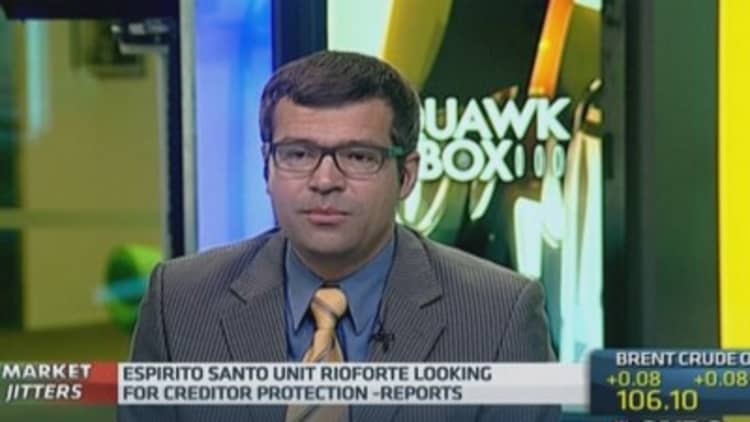
The saga surrounding troubled Portuguese lender Banco Espirito Santo (BES) took another twist on Wednesday, with the fortunes of a telecoms merger shedding more light on the strength of the country's banking sector.
Portugal Telecom rushed Wednesday to salvage a possible tie-up with Oi, the Brazilian telecoms company, after a possible default by Rioforte, an investment unit of the Espirito Santo group, called the deal into question.
The two telecoms firms said they had signed a "memorandum of understanding", in the hope of keeping the deal alive, and insisted they remained committed to "full completion" of the deal. Shares in Portugal Telecom rose 6.8 percent in morning trade.
Read MorePortugal's BES hits back–should we blame the parent?
Here's a quick look at the latest twist in the Portuguese saga:
Rioforte misses payments
Concerns about a Portugal Telecom-Oi deal arose after Rioforte - a holding company of the Espírito Santo Group, which is responsible for its non-financial investments - missed a debt repayment of 847 million euros ($1.15 billion) on Tuesday evening.
Portugal Telecom bought the debt from Luxembourg-based Rioforte in April and it was held in subsidiaries of Portugal Telecom that were given to Oi in May in anticipation of the deal.
However, both parties have now revised the terms of the merger and the Rioforte debt will be passed back to Portugal Telecom. The company has also said that it would pursue legal and procedural options against Rioforte and related parties to the "full extent of the law" in the hope of securing repayments on the debt.
Read MoreHere's what's happening in Portugal
But Bill Blain, a fixed income strategist at Mint Partners, argued that debt of the various Espirito Santo holding companies was most likely "toast".
With regards to BES, he said the troubled lender should be now worried about its exposure to Portugal Telecom.
"In the utter absence of any clear information or transparency, my best guess is that BES looks more and more likely to bail-in subordinated debt holders," he said in a note, with junior debt holders facing the possibility of losing part of their investment.
"It will breach capital thresholds and require support – meaning pain for bondholders...(I) still think the senior debt will be fine – but let's keep an eye on it."
He added that every leaked "data bomb" meant BES was starting to look like Icelandic bank Kaupthing, which collapsed during the country's financial crisis at the end of the last decade.
Markets hit?
Last week, financial markets around the globe were rocked with the belief that the issues with Espirito Santo could spark a new banking crisis in the euro zone.
Yields on Portuguese debt rose and investors fled to lower-risk assets. BES' parent company, Espirito Santo International (ESI), was at the center of concerns after an audit by the country's central bank in May showed "irregularities" in its accounts.
The flames were fanned once again last week when debt repayments to clients on commercial paper issued by ESI were delayed. Shares in another part of the conglomerate, Espirito Santo Financial Group (ESFG), were temporarily suspended on the news, after it cited "material difficulties" at ESI.
Investors took a fairly lenient view on these new developments on Wednesday. As well as Portugal Telecom shares gaining, Banco Espirito Santo shares were up 16 percent in morning trade, with regulators extending a short-selling ban on its stock. Yields on Portuguese sovereign debt – which was badly hit last week - tightened slightly against German bunds.
Read MorePortugal concerns compound global stock selloff
The ownership structure of the Espirito Santo group is complicated, and has exacerbated recent problems.
BES' parent company, ESI, owns 49 percent of ESFG, which in turn owns 25 percent of the BES. Thus, any problems at BES' parent companies also cause issues for the Portuguese lender. Rioforte, which holds assets like real estate and healthcare, also holds a 49 percent stake in ESFG, further underlining the complicated ownership structure of the companies.
Default likely?
Otto Dichtl, managing director at Stifel Nicolaus, said Rioforte's missed payments indicated the units of the Espirito Santo group did not have access to fresh liquidity. On Tuesday, Reuters reported that Rioforte was preparing to file for creditor protection in the hope of preventing insolvency, citing a source.
"There's a lot of short term debt which is all maturing," Dichtl told CNBC. "Therefore it looks like a filing is really imminent."


